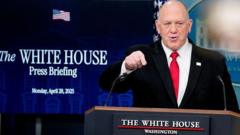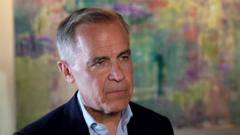Following a closely watched general election, President Donald Trump extended his congratulations to Canada's newly elected Prime Minister Mark Carney, with plans for the two leaders to meet soon. Carney's Liberal Party secured a minority government amid significant national challenges, including economic relations with the U.S. and domestic issues.
Trump Hails Carney's Election Win, Anticipates Future Talks

Trump Hails Carney's Election Win, Anticipates Future Talks
In a phone call following Canada's election, Trump congratulated Carney and highlighted the need for collaboration between the U.S. and Canada.
The election concluded with the Liberals capturing 169 seats, just shy of the majority needed in the House of Commons, which adds complexity to Carney’s mandate. In a recent statement from the Prime Minister’s Office, both leaders expressed a commitment to working together as sovereign nations to enhance mutual prosperity. Carney will face the task of forming alliances with other political parties to govern effectively.
With Trump’s trade policies looming large over the election, past tensions have spurred debates on Canada’s sovereignty and trade matters. The election, characterized by a notable shift for the Liberals, has also revealed a landscape where collaboration among political factions may be necessary for stability, as underscored by Bloc Québécois leader Yves-Francois Blanchet.
Amid these challenges, Carney remains focused on pressing domestic issues like housing and economic support, while also preparing for the G7 summit Canada will host next year. As the U.S. looks toward its relationship with its northern neighbor, the newly minted Prime Minister asserts that future alliances must respect Canada’s autonomy in trade agreements going forward.
While voter turnout reached 67%, the Conservative Party emerged as the primary opposition. The shift in Canadian politics reflects a complex landscape where larger parties gained traction at the expense of smaller ones. As both nations navigate this new chapter, the dynamics of their partnership remain in flux, particularly under Trump's governance.
Carney's resolve to ensure that Canada's interests are prioritized underscores his stance against the notion of Canada as a subordinate entity to U.S. protocols. Additionally, with new U.S. ambassador Pete Hoekstra emphasizing commitment to strong bilateral ties, the future relationship may hinge on shared respect and collaboration in addressing critical issues.
With Trump’s trade policies looming large over the election, past tensions have spurred debates on Canada’s sovereignty and trade matters. The election, characterized by a notable shift for the Liberals, has also revealed a landscape where collaboration among political factions may be necessary for stability, as underscored by Bloc Québécois leader Yves-Francois Blanchet.
Amid these challenges, Carney remains focused on pressing domestic issues like housing and economic support, while also preparing for the G7 summit Canada will host next year. As the U.S. looks toward its relationship with its northern neighbor, the newly minted Prime Minister asserts that future alliances must respect Canada’s autonomy in trade agreements going forward.
While voter turnout reached 67%, the Conservative Party emerged as the primary opposition. The shift in Canadian politics reflects a complex landscape where larger parties gained traction at the expense of smaller ones. As both nations navigate this new chapter, the dynamics of their partnership remain in flux, particularly under Trump's governance.
Carney's resolve to ensure that Canada's interests are prioritized underscores his stance against the notion of Canada as a subordinate entity to U.S. protocols. Additionally, with new U.S. ambassador Pete Hoekstra emphasizing commitment to strong bilateral ties, the future relationship may hinge on shared respect and collaboration in addressing critical issues.





















